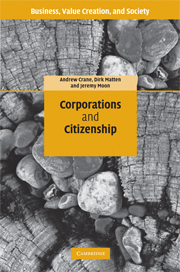1 - Introducing corporations and citizenship
Published online by Cambridge University Press: 22 September 2009
Summary
As the world continues to integrate, reconciling the tensions between efficient global economics and local democratic politics will test everyone's imagination.
Financial Times, Leader comment, 13 June 2006Introduction
The assumption that corporations have economic, legal and even social roles but, beyond these, no political role or significance, is becoming increasingly untenable. Although conventional economic theory continues to be based on a clear divide between economic and political domains, where the state sets the rules within which business must act, a blurring of boundaries between the two domains is clearly in evidence. Wittingly or otherwise, corporations are becoming much more part of politics. They are now more engaged in governmental and inter-governmental rule-making at one extreme, and in community level issue-resolution at the other. The social and economic fortunes of whole communities are subject to corporate discretion to invest or divest, and the power that corporations necessarily possess in these decisions has increasingly brought them into the political sphere. Indeed, global political debates about climate change, conflict, poverty, human rights, equality and social justice, among other things, rarely now take place without some consideration of, or input from, corporations or their representatives. They have even become embroiled in the expression or suppression of particular racial or cultural identities, not only among their workers and consumers, but also among other humans with no obvious interest in their products or services.
For some then, corporations should self-evidently be considered as political actors (see Scherer and Palazzo 2007 for a summary).
- Type
- Chapter
- Information
- Corporations and Citizenship , pp. 1 - 14Publisher: Cambridge University PressPrint publication year: 2008
- 2
- Cited by

